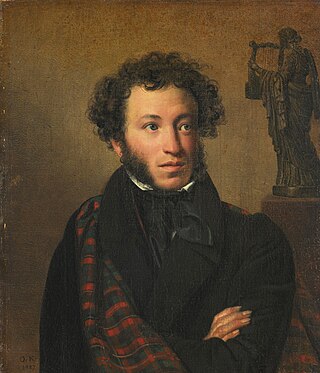
Alexander Sergeyevich Pushkin was a Russian poet, playwright, and novelist of the Romantic era. He is considered by many to be the greatest Russian poet, as well as the founder of modern Russian literature.

Alexander Petrovich Sumarokov was a Russian poet and playwright who single-handedly created classical theatre in Russia, thus assisting Mikhail Lomonosov to inaugurate the reign of classicism in Russian literature.

Mikhail Yuryevich Lermontov was a Russian Romantic writer, poet and painter, sometimes called "the poet of the Caucasus", the most important Russian poet after Alexander Pushkin's death in 1837 and the greatest figure in Russian Romanticism. His influence on Russian literature is felt in modern times, through his poetry, but also his prose, which founded the tradition of the Russian psychological novel.
Ottava rima is a rhyming stanza form of Italian origin. Originally used for long poems on heroic themes, it later came to be popular in the writing of mock-heroic works. Its earliest known use is in the writings of Giovanni Boccaccio.
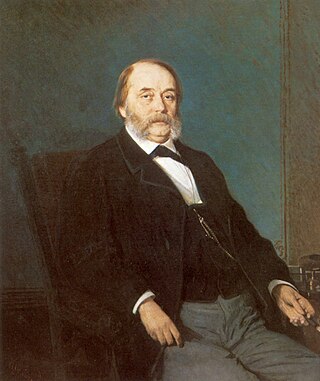
Ivan Aleksandrovich Goncharov was a Russian novelist best known for his novels The Same Old Story, Oblomov (1859), and The Precipice. He also served in many official capacities, including the position of censor.
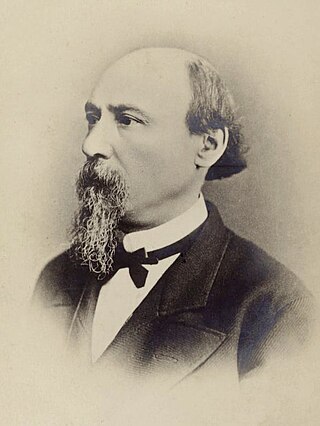
Nikolay Alexeyevich Nekrasov was a Russian poet, writer, critic and publisher, whose deeply compassionate poems about the Russian peasantry made him a hero of liberal and radical circles in the Russian intelligentsia of the mid-nineteenth century, particularly as represented by Vissarion Belinsky and Nikolay Chernyshevsky. He is credited with introducing into Russian poetry ternary meters and the technique of dramatic monologue. As the editor of several literary journals, notably Sovremennik, Nekrasov was also singularly successful and influential.

Yevgeny Abramovich Baratynsky was lauded by Alexander Pushkin as the finest Russian elegiac poet. After a long period when his reputation was on the wane, Baratynsky was rediscovered by Russian Symbolism poets as a supreme poet of thought.

Count Aleksey Konstantinovich Tolstoy, often referred to as A. K. Tolstoy, was a Russian poet, novelist, and playwright. He is considered to be the most important nineteenth-century Russian historical dramatist, primarily on account of the strength of his dramatic trilogy The Death of Ivan the Terrible (1866), Tsar Fyodor Ioannovich (1868), and Tsar Boris (1870). He also gained fame for his satirical works, published under his own name and under the collaborational pen name of Kozma Prutkov. His fictional works include the novella The Family of the Vourdalak, The Vampire (1841), and the historical novel Prince Serebrenni (1862).

Vasily Andreyevich Zhukovsky was the foremost Russian poet of the 1810s and a leading figure in Russian literature in the first half of the 19th century. He held a high position at the Romanov court as tutor to the Grand Duchess Alexandra Feodorovna and later to her son, the future tsar Alexander II.

Apollon Nikolayevich Maykov was a Russian poet, best known for his lyric verse showcasing images of Russian villages, nature, and history. His love for ancient Greece and Rome, which he studied for much of his life, is also reflected in his works. Maykov spent four years translating the epic The Tale of Igor's Campaign (1870) into modern Russian. He translated the folklore of Belarus, Greece, Serbia and Spain, as well as works by Heine, Adam Mickiewicz and Goethe, among others. Several of Maykov's poems were set to music by Russian composers, among them Rimsky-Korsakov and Tchaikovsky.

Ippolit Fyodorovich Bogdanovich was a Russian classicist and rococo author of light poetry, best known for his long poem Dushenka (1778).

Nikolay Ivanovich Gnedich was a Ukrainian-born Russian poet and translator best known for his translation of the Iliad (1807–29), which is still the standard one. He also wrote Don Corrado de Gerrera (1803), which has been called the first Russian Gothic novel.
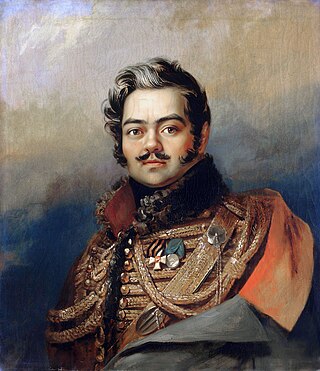
Denis Vasilyevich Davydov was a Russian soldier-poet of the Napoleonic Wars who invented the genre of hussar poetry, characterised by hedonism and bravado. He used events from his own life to illustrate such poetry. He suggested and successfully pioneered guerrilla warfare in the Patriotic War of 1812 against Napoleon.

Denis Ivanovich Fonvizin was a playwright and writer of the Russian Enlightenment, one of the founders of literary comedy in Russia. His main works are two satirical comedies—including Young ignoramus, which mocks contemporary Russian gentry—and are still staged today.
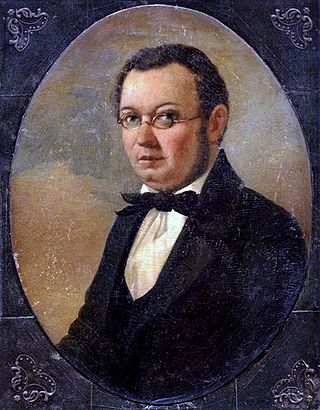
Pyotr Pavlovich Yershov was a Russian poet and author of the famous fairy-tale poem The Little Humpbacked Horse (Konyok-Gorbunok).
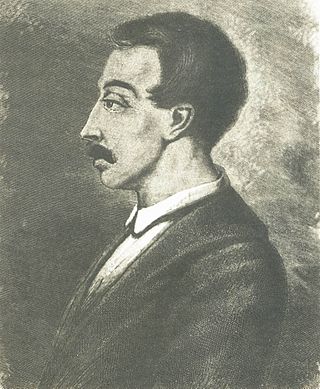
Wilhelm Ludwig von Küchelbecker was a Russian Romantic poet and Decembrist revolutionary of German descent.

Ivan Savvich Nikitin was a Russian poet.
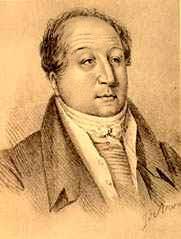
Vasily Lvovich Pushkin was a minor Russian poet best known as an uncle of the much more famous Alexander Pushkin.

Alexey Nikolayevich Verstovsky was a Russian composer, musical bureaucrat and rival of Mikhail Glinka.

Evening Bell is a popular Russian song written in 1828 by Ivan Kozlov and Alexander Alyabyev. The lyrics are adapted from a Russian-themed verse by Thomas Moore.



















